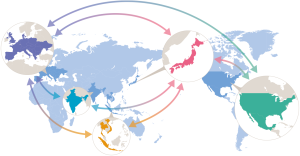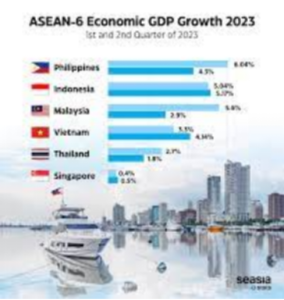The Southeast Asian (S.E.A.) region has emerged as one of the world’s most dynamic and rapidly growing markets. With its diverse economies, expanding middle class, and strategic location, the region offers numerous opportunities for businesses looking to expand globally and holds immense growth potential that can be harnessed.

However, foreign companies can find navigating the complex legal frameworks, investment opportunities, and visa requirements time-consuming and effort-consuming. Expert services, such as those offered by ILA Global Consulting, play a crucial role in simplifying these processes, providing businesses with reassurance and confidence.
You can choose from many types of profitable businesses in various sectors and do international business through trade. Trade is the exchange of goods. So, global trade is a product and service transaction activity between countries to make a profit.
This condition generally occurs due to factors of need or limitations experienced by a country, so it is felt necessary to establish business relationships with other countries. Apart from that, what does this international business include? Following is the complete review.
Understanding International Business
Understood, international business is a business in which all activities are carried out across national borders. This applies not only to trade but also to manufacturing and service industries, which are developing in various fields such as transportation, tourism, construction, mass communication, advertising, wholesale banking, and retail trade.
Import activities are one example of international trade. This activity involves purchasing goods or services from abroad. For instance, foreign goods such as oil and gas, rice, pharmaceuticals, and electronic equipment enter Indonesia. Apart from imports, export activities can also be considered part of this type of business. This activity is the delivery of goods made domestically and then sent abroad.
SEA Business Challenges
Running an international business does not mean it is without obstacles; compared to the domestic market, this type of business has many barriers. Sometimes, other countries also have various interests, which can create barriers to international business transactions. Apart from the different cultures in each country, here are several other barriers that can hinder business activities:
- Language and Socio-Cultural Differences
Language differences are one factor that often obstructs the smooth running of international business activities. Language is a vital means of communication, both verbal and written. - Political Conditions and Laws
The political relationship between a country and another country is also one obstacle to business relations between the two countries. Laws or laws imposed by a country also sometimes greatly limit these international business relationships. - Customs Tariffs and Trade Restrictions
Customs tariffs here are taxes that apply to traded goods, both exports and imports. - Obstacles from an operational perspective
The final obstacle to international business or trade is operational. This includes transporting traded goods from one country to another.
Current Trends in the Southeast Asian Market
Southeast Asia’s economic growth has been a significant driver of global investment. Countries like Indonesia, Vietnam, and the Philippines have experienced robust G.D.P. growth fueled by urbanization and a rapidly growing middle class. This economic rise presents business opportunities across industries, from technology to manufacturing.
SEA GDP Growth by Country (2023)
| Country | GDP Growth Rate (%) |
| Indonesia | 5.1% |
| Vietnam | 6.2% |
| Malaysia | 4.8% |
| Philippines | 6.0% |
SEA’s growth is driven by several factors including a young, tech-savvy Population and an increasing demand for digital services. Sectors like fintech, e-commerce, and tech startups are experiencing exponential growth, making them attractive for foreign investment. The region’s focus on sustainable development also opens green energy and infrastructure opportunities.

“SEA’s economic potential remains unmatched, especially in the tech and sustainable development sectors. For businesses, the region is about growth and resilience, as seen in its recovery from global economic shocks.” – Dr Emily Tan, Economist and SEA Market Analyst.
Legal Challenges in the SEA Market
Complex Regulatory Frameworks
Expanding into SEA markets comes with its own set of legal challenges. Each country in the region has unique legal frameworks, and businesses must navigate these carefully to avoid regulatory pitfalls. Understanding the local legal landscape is crucial and empowers companies to be well-informed and prepared.

For instance, Indonesia has stringent labour laws and foreign ownership regulations, while Vietnam’s regulatory framework is known for its complexity regarding business permits. Working with a legal expert like ILA Global Consulting can help businesses ensure they are compliant with all local regulations.
Market Entry Requirements
When entering a new market, businesses must adhere to various legal requirements such as company registration, tax filings, and licensing. Visa and work permit regulations are also critical for companies looking to relocate employees or hire foreign talent.
For instance, a European fintech company looking to enter the Indonesian market navigated complex local tax laws and secured the necessary business licenses through ILA Global Consulting. ILA managed legal and visa services, helping the company set up operations seamlessly within six months.
Similarly, a U.S. manufacturing company successfully expanded into Vietnam with the help of ILA, overcoming regulatory barriers and establishing a solid presence in the market.
Investment Opportunities in SEA
Top Investment Destinations
Countries like Indonesia, Singapore, and Vietnam are leading the way as top destinations for foreign direct investment (FDI) in Southeast Asia. These nations offer competitive advantages such as favourable tax incentives, strategic location, and a large consumer base.
FDI Inflows into SEA Countries (2023)
| Country | FDI Inflow (USD Billion) |
| Indonesia | 35.0 |
| Singapore | 110.0 |
| Vietnam | 23.8 |
These countries are beautiful to investors in renewable energy, manufacturing, and technology sectors. However, navigating investment laws, especially in industries where foreign ownership is restricted, can be tricky. ILA Global Consulting helps investors by offering tailored legal advice that ensures compliance with local regulations while maximizing investment returns.
Challenges for Foreign Investors
Despite the lucrative opportunities, foreign investors face several challenges. Countries like Vietnam restrict foreign ownership in real estate and media sectors, and Indonesia has tight regulations on foreign direct investment in specific industries. Additionally, navigating the complex tax laws and understanding these countries’ cultural and business practices can be daunting for foreign investors.
“Foreign investors are often overwhelmed by the layers of regulations in SEA markets. Working with a consultancy like ILA Global is key to overcoming these barriers and maximizing ROI.” – John Lee, Investment Strategist.
Visa and Immigration Services for Businesses
Regional Visa Policies
For businesses expanding into SEA, visa and immigration services are crucial. Most SEA countries have specific visa requirements for business owners, employees, and investors. From temporary business visas to long-term residency permits, navigating these regulations can be time-consuming and complex.
Countries like Singapore and Malaysia offer special visa programs for foreign investors, while Indonesia’s visa regulations focus more on specific business activities. ILA Global Consulting specializes in helping businesses secure the correct type of visa and ensure all documentation is handled efficiently.

According to the latest data, the number of business-related visas issued across SEA countries grew by 12% in 2023, reflecting the growing demand for cross-border mobility in the region.
Cross-Border Mobility
In addition to securing visas, businesses also need to manage the cross-border mobility of their workforce. For multinational companies, it’s essential to ensure that employees can travel freely across borders for business meetings and operational purposes.
ILA Global Consulting offers comprehensive visa and immigration services that simplify this process, helping businesses focus on their core activities while ensuring legal compliance.
Best Way to Expand Your Market in SEA
Southeast Asia presents unparalleled opportunities for global business expansion. However, the region’s diverse legal landscapes, invei uuuuuuuu stment challenges, and visa regulations require specialised expertise. ILA Global Consulting offers the legal, investment, and visa services necessary to help businesses successfully navigate the SEA market.
For companies looking to expand into this dynamic region, working with a trusted consulting partner like ILA is essential to overcoming regulatory hurdles and achieving long-term success.
Information contained on this page is provided by an independent third-party content provider. Binary News Network and this Site make no warranties or representations in connection therewith. If you are affiliated with this page and would like it removed please contact [email protected]



Comments